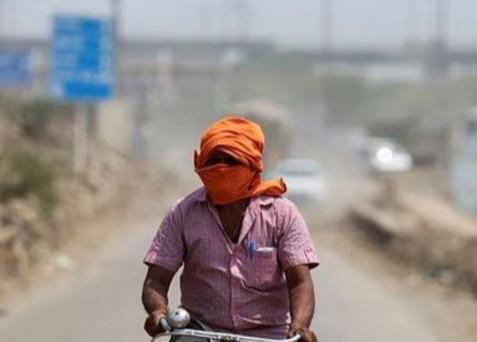
Title: Extreme Heat Endangering Health & Productivity of Workers: Report
As the world grapples with the consequences of climate change, a recent report by the World Health Organisation (WHO) and the World Meteorological Organisation (WMO) has sounded the alarm bell on the devastating impact of extreme heat on workers’ health and productivity. According to the report, worker productivity drops by 2-3% for every degree above 20°C, leading to a significant decline in overall performance and efficiency.
The report, which was published in the midst of a sweltering summer, highlights the alarming risks faced by workers in various sectors, particularly manual workers in agriculture, construction, and vulnerable populations such as children and the elderly in developing countries. The heat-related health risks are no less severe, with heatstroke, dehydration, and kidney dysfunction topping the list of potential hazards.
Heat Wreaks Havoc on Worker Productivity
The report underscores the significant impact of extreme heat on workers’ productivity, with every degree above 20°C leading to a decline in performance. This translates to a substantial loss in productivity, particularly for workers who are already struggling to cope with the demands of their jobs. The consequences are far-reaching, with businesses and economies likely to feel the pinch as a result of reduced output and decreased efficiency.
Agricultural workers, who toil under the scorching sun, are particularly vulnerable to the effects of extreme heat. Their work is physically demanding, and the heat can exacerbate existing health conditions, leading to a range of heat-related illnesses. Construction workers, too, are at risk, as they often work in confined spaces without adequate ventilation or air conditioning.
Vulnerable Populations at Risk
The report highlights the particularly alarming situation faced by vulnerable populations such as children and the elderly in developing countries. These groups are often more susceptible to heat-related illnesses due to their physical limitations and reduced ability to adapt to extreme temperatures.
Children, who are still developing, are more prone to heat-related illnesses, and their young bodies are less able to regulate their temperature. Elderly individuals, on the other hand, may have pre-existing medical conditions that make them more susceptible to heat-related illnesses.
In developing countries, where access to healthcare and healthcare infrastructure may be limited, the risks are even more pronounced. Heat-related illnesses can quickly escalate into life-threatening conditions, and the lack of access to medical treatment can have devastating consequences.
Health Risks Associated with Extreme Heat
The report highlights the range of health risks associated with extreme heat, including:
- Heatstroke: A potentially life-threatening condition that occurs when the body’s temperature regulation system is overloaded.
- Dehydration: A condition that can lead to severe health complications, including kidney damage and seizures.
- Kidney dysfunction: Prolonged exposure to extreme heat can lead to kidney damage, which can have long-term consequences on overall health.
The report emphasizes the need for urgent action to mitigate the impact of extreme heat on workers’ health and productivity. Governments, businesses, and individuals must work together to develop and implement effective strategies to reduce the risks associated with extreme heat.
Measures to Mitigate the Impact
The report suggests several measures to mitigate the impact of extreme heat on workers’ health and productivity, including:
- Providing adequate shade and cooling measures for workers.
- Implementing heat stress management protocols in workplaces.
- Encouraging workers to take regular breaks and stay hydrated.
- Providing training on heat-related illnesses and first aid.
- Developing and implementing heat-related policies and guidelines for workplaces.
Conclusion
The report by the WHO and WMO serves as a stark reminder of the devastating impact of extreme heat on workers’ health and productivity. As the world grapples with the consequences of climate change, it is imperative that we take immediate action to mitigate the risks associated with extreme heat.
Governments, businesses, and individuals must work together to develop and implement effective strategies to reduce the risks associated with extreme heat. By taking proactive steps to address this issue, we can help protect the health and well-being of workers and ensure that they continue to thrive in the face of an increasingly challenging climate.
Source:
https://repository.inshorts.com/articles/en/PTI/45d9bd2d-ff57-417c-9e5f-831344bb34b0






